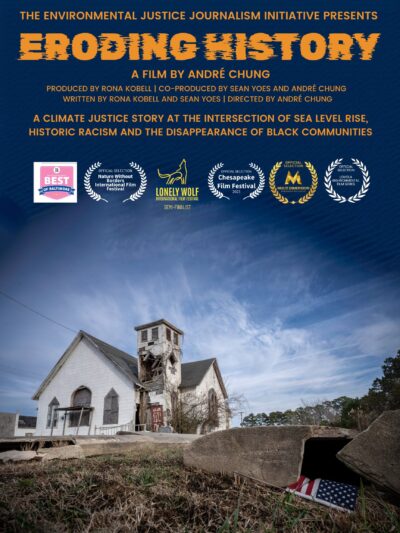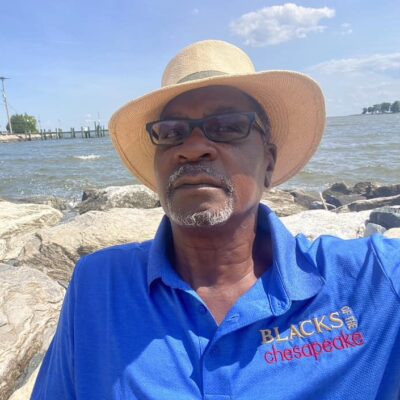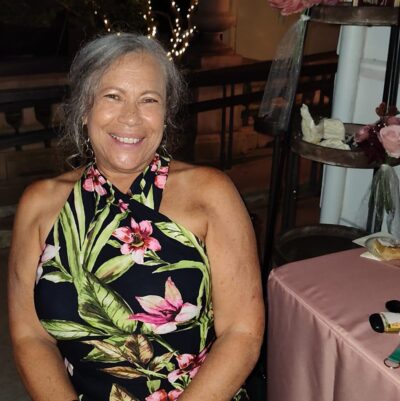 Join the SNF Agora Institute for a screening of Eroding History, a film co-written and produced by SNF Agora Visiting Fellow Rona Kobell. After the film, Kobell will lead a discussion with Deal Island residents Chanelle Acheamfour and Renee Chapman; Blacks of the Chesapeake founder and Chesapeake historian Vincent Leggett; and University of Maryland agroecologist Kate Tully.
Join the SNF Agora Institute for a screening of Eroding History, a film co-written and produced by SNF Agora Visiting Fellow Rona Kobell. After the film, Kobell will lead a discussion with Deal Island residents Chanelle Acheamfour and Renee Chapman; Blacks of the Chesapeake founder and Chesapeake historian Vincent Leggett; and University of Maryland agroecologist Kate Tully.
Refreshments will be served.
Eroding History tells the story of two Black communities on Maryland’s Deal Island Peninsula that are losing their land and their history due to the intersection of historical racism and modern climate changes. Many of those interviewed are related to the writer James Baldwin, whose mother grew up on the island. André Chung, a news and portrait photographer who won the 2021 Robert F. Kennedy Journalism Award for Domestic Photography, directed Eroding History. West Baltimore filmmaker and journalist Sean Yoes co-wrote and co-produced the film. Longtime Chesapeake Bay chronicler Rona Kobell, an AY23-24 SNF Agora Visiting fellow, produced and co-wrote it. Kobell’s MA thesis at the University of Maryland inspired the film, and she will spend this year turning her research into a book.
Eroding History is among the few Chesapeake Bay films that center Black communities at the forefront of climate change. Black people are often on the lowest land, because that was the only land that was available to them. On the Eastern Shore, where everything is low, the lowest spot is a dangerous place. Rising water, saltwater intrusion, and marsh migration are endangering Black lands at a rapid pace. That Black filmmakers are telling these stories is important, and Environmental Justice Journalism Initiative, a nonprofit Kobell co-founded, is providing a platform for telling and disseminating these films.
Eroding History premiered at Baltimore’s Senator Theatre on April 18, to an audience of close to 400 viewers. Since then, the film has won several awards and has been shown in several film festivals. Eroding History won Baltimore Magazine ‘s 2023 award for Best Environmental Reporting. The film was an official selection at the Chesapeake International Film Festival in Easton, the Loyola Environmental Film Festival in Baltimore, the Multi-Dimension Film Festival in London, and the Nature Without Borders Film Festival in Rehoboth Beach. Chung was named a semi-finalist for Best Director in the Lonely Wolf Film Festival in London.
You can read more about the film here, and watch a trailer here.
This screening is free and open to the public, but registration is required.
This event is co-sponsored by JHU’s Department of History, Department of Anthropology, Center for Environmental Science and Studies, and the Center for Africana Studies.
This event is hosted in accompaniment with the release of the university’s Draft Climate Action and Sustainability Plan, outlining JHU’s vision for a healthy, just, and sustainable future. Visit the JHU Sustainability website to read the Plan and provide your feedback, or learn more about upcoming events and town halls.
About our Speakers:
 Vincent Leggett is the Founder and President of Blacks of the Chesapeake, and the Leggett Group USA. Vince focuses on Black history in the Chesapeake Bay and elevating the stories of Black mariners, watermen, craftsmen, and boatwrights. A land-use planner by training, he was the former CEO of the Housing Commission of Anne Arundel County and remains active in civic causes in Annapolis and beyond.
Vincent Leggett is the Founder and President of Blacks of the Chesapeake, and the Leggett Group USA. Vince focuses on Black history in the Chesapeake Bay and elevating the stories of Black mariners, watermen, craftsmen, and boatwrights. A land-use planner by training, he was the former CEO of the Housing Commission of Anne Arundel County and remains active in civic causes in Annapolis and beyond.
 Kate Tully is an associate professor in the department of plant science and landscape architecture at the University of Maryland. An expert on saltwater intrusion, she is focusing on helping Eastern Shore farmers grow salt-tolerant crops that will flourish as the landscape changes. She is the author of several key papers on saltwater’s intrusion into Delmarva, which she and her colleagues have called “the invisible flood.”
Kate Tully is an associate professor in the department of plant science and landscape architecture at the University of Maryland. An expert on saltwater intrusion, she is focusing on helping Eastern Shore farmers grow salt-tolerant crops that will flourish as the landscape changes. She is the author of several key papers on saltwater’s intrusion into Delmarva, which she and her colleagues have called “the invisible flood.”
 Chanelle White Acheamfour is an associate professor of biology at Delaware State University. She was a longtime scholar at the University of Maryland, Eastern Shore, in Princess Anne. Chanelle has lived on Deal Island all her life, and started the efforts to preserve the John Wesley Church that the film documents. Though she works in Dover, she still lives on Deal Island.
Chanelle White Acheamfour is an associate professor of biology at Delaware State University. She was a longtime scholar at the University of Maryland, Eastern Shore, in Princess Anne. Chanelle has lived on Deal Island all her life, and started the efforts to preserve the John Wesley Church that the film documents. Though she works in Dover, she still lives on Deal Island.
 Rona Kobell is the co-founder of the Environmental Justice Journalism Initiative. A longtime reporter for the Baltimore Sun, the Chesapeake Bay Journal, and Chesapeake Quarterly magazine, she produced and co-wrote Eroding History. She is a 2023 SNF AGORA Fellow and planning to turn her research on Black communities into a book.
Rona Kobell is the co-founder of the Environmental Justice Journalism Initiative. A longtime reporter for the Baltimore Sun, the Chesapeake Bay Journal, and Chesapeake Quarterly magazine, she produced and co-wrote Eroding History. She is a 2023 SNF AGORA Fellow and planning to turn her research on Black communities into a book.
 Ruby “Renee” Lynn Chapman was raised on Deal Island and spent her career in Washington, working most recently for the U.S. Department of Veterans Affairs. A cousin of Chanelle’s she’s been active in the push to preserve Deal Island’s history and hopes to find a property there to which she can return. Renee has attended many screenings of Eroding History and worked to spread gthe word within the Deal Island diaspora about the film.
Ruby “Renee” Lynn Chapman was raised on Deal Island and spent her career in Washington, working most recently for the U.S. Department of Veterans Affairs. A cousin of Chanelle’s she’s been active in the push to preserve Deal Island’s history and hopes to find a property there to which she can return. Renee has attended many screenings of Eroding History and worked to spread gthe word within the Deal Island diaspora about the film.
